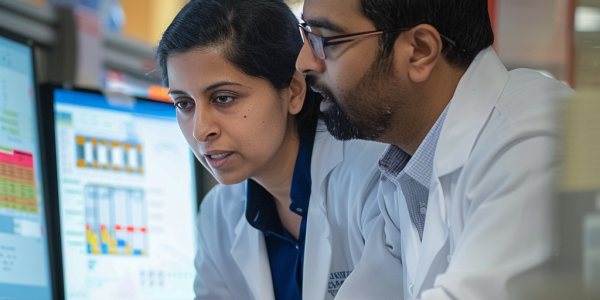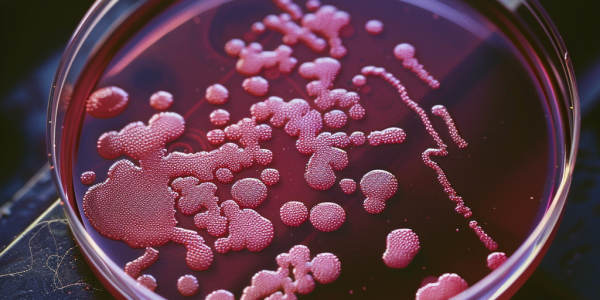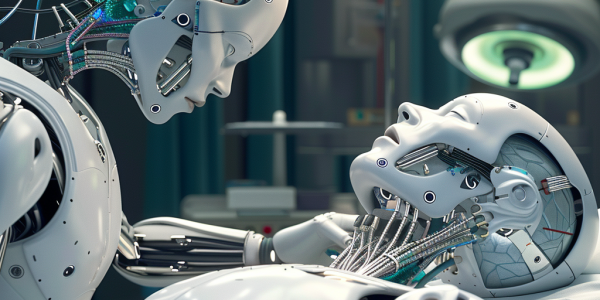Matcha Green Tea Shows Promise in Combating Periodontitis Bacteria
Discover how matcha, a finely ground green tea powder, may help combat periodontitis by inhibiting the growth of bacteria like Porphyromonas gingivalis. Recent studies have shown promising results in both lab experiments and clinical studies, suggesting that matcha could be beneficial in preventing and treating gum disease. Learn more about the potential antimicrobial properties of green tea and how matcha mouthwash could play a role in promoting oral health.
Researchers Create World’s First Human Mini-Brain with Fully Functional Blood-Brain Barrier
Discover how researchers at Cincinnati Children’s Hospital Medical Center have created the world’s first human mini-brain with a fully functional blood-brain barrier (BBB), revolutionizing the study and treatment of brain disorders. This breakthrough enables a deeper understanding of neurological conditions and paves the way for innovative therapeutic strategies.
US Pediatricians Update Policy on Breastfeeding for HIV-Positive Mothers
US pediatricians have updated their policy on breastfeeding for HIV-positive mothers, now supporting it with effective antiretroviral medication. This shift reflects advancements in HIV treatment and the understanding of viral suppression. By endorsing breastfeeding under specific conditions, the American Academy of Pediatrics prioritizes maternal and child health, emphasizing evidence-based practices and comprehensive healthcare services.
Study Predicts Kidney Function Recovery Using Health Factors
A recent study by the University of Cincinnati reveals advancements in predicting kidney function recovery using health factors. Led by Dr. Silvi Shah and Dr. Charuhas Thakar, the research focuses on dialysis-dependent acute kidney injury (AKI) and its recovery. Published in the Clinical Kidney Journal and funded by NIH, the study aims to improve patient outcomes by analyzing various health factors. This groundbreaking research offers hope for more personalized interventions for patients with kidney injuries.
PEPITEM: A Promising New Therapeutic for Bone Repair
Birmingham researchers have discovered a promising peptide called PEPITEM for bone repair, offering new hope for osteoporosis treatment. PEPITEM enhances bone mineralization and strength by regulating osteoblasts and osteoclasts. This breakthrough could lead to more effective therapies for musculoskeletal diseases, addressing current treatment limitations.
Study Shows Metformin May Reduce Risk of Blood Cancer
A recent study reveals that the diabetes drug metformin may reduce the risk of blood cancer, specifically myeloproliferative neoplasm (MPN). Apart from its primary function, metformin has shown potential in lowering the risk of colorectal, breast, and prostate cancers, as well as cancer-related death. The drug’s benefits also include anti-aging effects, weight loss, improved fertility in individuals with PCOS, and potential cardiovascular health enhancements.
Breakthrough in Cancer Research: Microbiome-Based Therapies Show Promise
A recent breakthrough in cancer research by a team from POSTECH and ImmunoBiome focuses on the use of a dietary-derived bacterial strain, IMB001, to enhance anti-tumor responses through ‘nutritional immunity’. The team’s study, published in Nature Immunology, reveals the potential of microbiome-based cancer therapies. Dr. Sin-Hyeog Im has developed a novel strategy for identifying beneficial bacteria suitable for cancer treatment, with plans to start a clinical trial in 2025. IMB001 has shown promising results in preclinical studies across various cancers, slowing down tumor progression and enhancing checkpoint inhibitor therapy efficacy.
The Rise of Egg Prices: Exploring the Factors Behind ‘Eggflation’
Discover the reasons behind the recent surge in egg prices, from pandemic-related impacts to rising production expenses. Learn about ‘Eggflation’ in the United States and how various factors are contributing to the current expensive egg market.
Study Finds Plastic Toy Building Bricks Contribute to Microplastic Pollution
Recent research has revealed that plastic toy building bricks can contribute to microplastic and nanoplastic pollution within households and childcare settings. The University of Newcastle study found that playing with these bricks releases thousands of tiny particles, posing potential health risks. This highlights the need for caution and further investigation into the impact of these plastic particles on indoor environments.
BrainBridge Unveils Groundbreaking Head Transplant Simulation Video
A groundbreaking video showcasing a head transplant simulation by BrainBridge, a US-based startup, has sparked awe on the internet. The company aims to develop the world’s first head transplant system to offer hope to individuals with untreatable conditions. Leveraging robotics and AI, BrainBridge plans to revolutionize head and face transplants, prompting both admiration and ethical concerns among social media users.
























